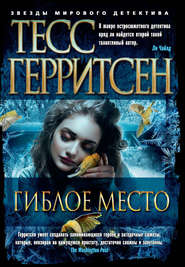По всем вопросам обращайтесь на: info@litportal.ru
(©) 2003-2024.
✖
Presumed Guilty
Автор
Год написания книги
2018
Настройки чтения
Размер шрифта
Высота строк
Поля
“No! No, no, no.” She was sobbing now, screaming out her denials. The sound of her own voice echoed like some alien cry in that stark box of a room. She dropped her head into her hands and leaned forward on the table. “No,” she whispered. She had to get away from this terrible man with his terrible questions. She started to rise from the chair.
“Sit down, Ms. Wood. We’re not finished.”
Obediently she sank back into the chair. “I didn’t kill him,” she cried. “I told you, I found him on my bed. I came home and he was lying there….”
“Ms. Wood—”
“I was on the beach when it happened. Sitting on the beach. That’s what I keep telling all of you! But no one listens. No one believes me….”
“Ms. Wood, I have more questions.”
She was crying, not answering, not able to answer. The sound of her sobs was all that could be heard.
At last Merrifield flicked off the recorder. “All right, then. We’ll take a break. One hour, then we’ll resume.”
Miranda didn’t move. She heard the man’s chair scrape back, heard Merrifield leave the room, then the door shut. A few moments later the door opened again.
“Ms. Wood? I’ll take you back to your cell.”
Slowly Miranda rose to her feet and turned to the door. A young cop stood waiting, nice face, friendly smile. His name tag said Officer Snipe. Vaguely she remembered him from some other time, from her life before jail. Oh, yes. Once, on a Christmas Eve, he’d torn up her parking ticket. It had been a kind gesture, gallantry offered to a lady. She wondered what he thought of the lady now, whether he saw murderer stamped on her face.
She let him lead her into the hall. At one end she saw Lieutenant Merrifield, huddled in conference with Chief Tibbetts. The polite Officer Snipe guided her in the opposite direction, away from the pair. Miranda had gone only a short distance when her footsteps faltered, stopped.
A man was standing at the far end of the hall, watching her. She had never seen him before. If she had, she certainly would have remembered him. He stood like some unbreachable barrier, his hands jammed in his pockets, his shoulders looming before her in the cramped corridor. He didn’t look like a cop. Cops had standards of appearance, and this man was on the far edge of rumpled—unshaven, dark hair uncombed, his shirt a map of wrinkles. What disturbed her the most was the way he looked at her. That wasn’t the passive curiosity of a bystander. No, it was something far more hostile. Those dark eyes were like judge and jury, weighing the facts, pronouncing her guilty.
“Keep moving, Ms. Wood,” said Officer Snipe. “It’s right around the corner.”
Miranda forced herself to move forward, toward that forbidding human barrier. The man moved aside to let her pass. As she did, she felt his gaze burning into her and heard his sharp intake of breath, as though he was trying not to breathe the same air she did, as if her very presence had somehow turned the atmosphere to poison.
For the past twelve hours she’d been treated like a criminal, handcuffed, fingerprinted, intimately searched. She’d had questions fired at her, humiliations heaped upon her. But never, until this man had looked at her, had she felt like a creature worthy of such disgust, such loathing. Rage suddenly flared inside her, a rage so fierce it threatened to consume her in its flames.
She halted and stared up at him. Their gazes locked. There, damn you! she thought. Whoever youare, take a look at me!Take a good, long look at themurderess. Satisfied?
The eyes staring down at her were dark as night, stony with condemnation. But as they took each other in, Miranda saw something else flicker in those depths, a hint of uncertainty, almost confusion. As if the picture he saw was all wrong, as if image and caption were terribly mismatched.
Just down the hall, a door swung open. Footsteps clicked out and stopped dead.
“Dear God,” whispered a voice.
Miranda turned.
Evelyn Tremain stood frozen in the washroom doorway. “Chase,” she whispered. “It’s her….”
At once the man went to Evelyn and offered her his steadying arm. Evelyn gripped it with both hands, as if holding on to her only lifeline. “Oh, please,” she murmured helplessly. “I can’t stand to look at her.”
Miranda didn’t move. She felt paralyzed by guilt, by what she’d done to this woman, to the whole family. Though her crime might not be murder, still she had committed a sin against Evelyn Tremain and for that she would always be tormented.
“Mrs. Tremain,” she said quietly. “I’m sorry….”
Evelyn buried her face against the man’s shoulder. “Chase, please. Get her out of here.”
“He loved you,” said Miranda. “I want you to know that. I want you to know that he never stopped loving—”
“Get her out of here!” cried Evelyn.
“Officer,” said Chase quietly. “Please. Take her away.”
Officer Snipe reached for Miranda’s arm. “Let’s go.”
As she was led away Miranda called over her shoulder, “I didn’t kill him, Mrs. Tremain! You have to believe that—”
“You tramp!” shouted Evelyn. “You filthy whore! You ruined my life.”
Miranda glanced back and saw the other woman had pulled away from Chase and was now facing her like some avenging angel. Strands of blond hair had fallen free and her face, always pale, was now a stark white.
“You ruined my life!” Evelyn screamed.
That accusing shriek echoed in Miranda’s ears all the way down that long walk to the jail.
Drained of resistance, she quietly entered the cell. She stood there, frozen, as the door clanged shut. Officer Snipe’s footsteps faded away. She was alone, trapped in this cage.
Suddenly she felt as if she were suffocating, as if she would smother without fresh air. She scrambled over to the one small window and tried to pull herself up by the bars, but it was too high. She ran to the cot, dragged it across the cell and climbed on top. Even then she was barely tall enough to peek over the sill, to gulp in a tantalizing taste of freedom. Outside the sun was shining. She could see maple trees beyond the fenced yard, a few rooftops, a sea gull soaring in the sky. If she breathed in deeply, she could almost smell the sea. Oh, Lord, how sweet it all seemed! How unattainable! She gripped the window bars so tightly they dug into her palms. Pressing her face against the sill, she closed her eyes and willed herself to stay in control, to keep panic at bay.
I am innocent. They have to believe me, she thought.
And then, What if they don’t?
No, damn it. Don’t think about that.
She forced herself to concentrate on something else, anything else. She thought of the man in the hallway, the man with Evelyn Tremain. What had Evelyn called him? Chase. The name stirred a memory; Miranda had heard it before. She snatched desperately at that irrelevant strand of thought, concentrated hard on dredging up the memory, anything to crowd the fears from her mind. Chase. Chase. Someone had said it. She tried to bring back the voice, to match it to the utterance of that name.
The memory hit her like a blow. It was Richard who’d said it. I haven’t seen my brother in years.Wehad a falling-out when my father died. But then,Chase was always the problem kid in the family….
Miranda’s eyes flew open with the revelation. Was it possible? There’d been no resemblance, no hint of familial ties in that face. Richard had had blue eyes, light brown hair, a weathered face always on the verge of sunburn. This man called Chase was all darkness, all shadow. It was hard to believe they were brothers. But that would explain the man’s coldness, his look of condemnation. He thought she’d murdered Richard, and repulsion was exactly what he would feel, coming face-to-face with his brother’s killer.
Slowly she sank onto the cot. Lying there beneath the window she could catch glimpses of blue sky and cloud. August. It would be a hot day. Already her T-shirt was damp with sweat.
She closed her eyes and tried to imagine soaring like a sea gull in that bright blue sky, tried to picture the island far below her.
But all she could see were the accusing eyes of Chase Tremain.
CHAPTER THREE
HE TRULY was the ugliest dog on earth.
Miss Lila St. John regarded her pet with a mixture of affection and pity. Sir Oscar Henry San Angelo III, otherwise known as Ozzie, was a rare breed known as a Portuguese Water Dog. Miss St. John was not quite clear as to the attributes of this particular breed. She suspected it was some sort of geneticist’s joke. Her niece had presented the dog to her— “to keep you company, Auntie”—and Miss St. John had been trying to remember ever since what that niece could hold against her. Not that Ozzie was entirely without redeeming value. He didn’t bite, didn’t bother the cat. He was a passable watchdog. But he ate like a horse, twitched like a mouse and was absolutely unforgiving if you neglected to take him on his twice-daily walk. He would stand by the door and whine.
The way he was doing now.

















